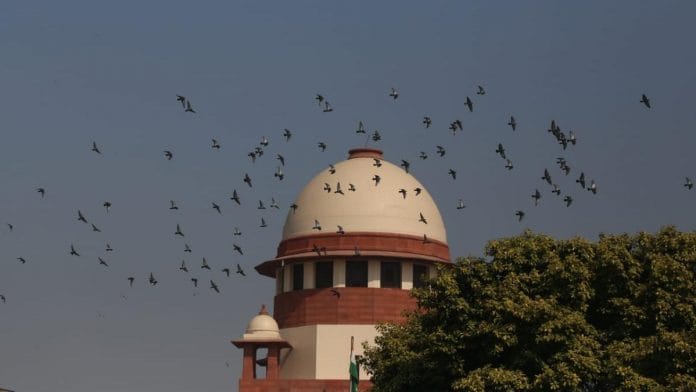New Delhi: A Supreme Court bench, led by Chief Justice of India (CJI) S.A. Bobde, Wednesday proposed creating an independent and a separate cadre of magistrates to assist police in investigation of crimes and collection of evidence.
The suggestion came when the court was hearing a suo motu case to address deficiencies in criminal trials.
The bench, also comprising Justices L.N. Rao and S. Ravindra Bhat, discussed the feasibility of having a special category of judicial magistrates who will ensure fool-proof collection of evidence at the crucial initial stages of an investigation.
“There are cases where police visits scene of murder and forgets to collect bullet and in rape scenes they forget to collect hair. This gravely affects the prosecution case. If magistrate is connected to the probe then it will help,” CJI Bobde observed, underscoring the need to have the special cadre.
Also read: Disha Ravi vs Safoora Zargar — why judge gave bail to one young activist but not the other
‘Intrusive role’ for magistrates
CJI Bobde also indicated that the court would take suo-motu cognisance of the matter and hold a detailed hearing on it, even though two senior advocates — R. Basant Kumar and Siddhartha Luthra — offered a divergent view on the issue.
Both Kumar and Luthra cited a Supreme Court judgment that recognises the supervisory role of a magistrate as regards to police investigation. However, to let them guide police investigation may create problems, they said.
They expressed apprehensions over the bench’s suggestion to have a more “intrusive role”, for the magistrates. “We don’t want to have a situation where a magistrate is committed to the investigation. By going to a scene of crime, a magistrate may then become a witness and cannot hear the case,” Luthra said.
In response to this, the bench said that under the existing system, a magistrate can become a witness in a trial, as they record statements of prosecution witnesses under section 164 of the Code of Criminal Procedure as well as dying declarations and also hold Test Identification Parade (TIP). TIP is used as a means to examine the truthfulness of a witness and his or her ability to identify unknown persons.
Kumar also had serious reservations about the proposal. He told the bench that a magistrate is there to give a free hand to an investigation until the final report is out. The magistrate is not to meddle with an investigation, he asserted.
At this, the bench clarified that it did not propose to make the magistrate, who is hearing the case, participate in an investigation, and that it contemplated creating an independent cadre of magistrates for investigative purposes.
“There are some serious cases, where police fail to collect crucial evidence … We need to think of a system, may be a different independent cadre,” Justice Bhat told the senior advocates.
The CJI added that participation of magistrates in the investigative process is likely to increase the public confidence in the system.
Also read: ‘Govts can’t walk into SC any time’ — this judge has a lesson for Centre, states on delays






